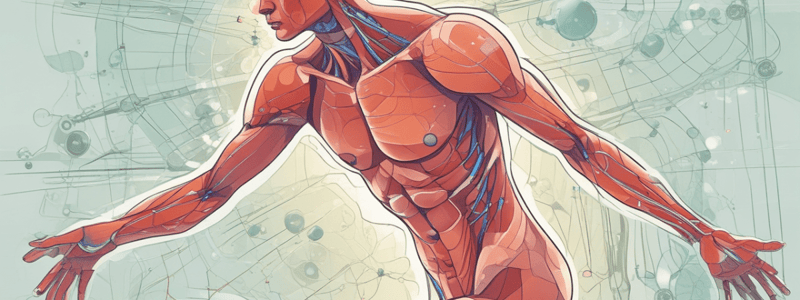Podcast
Questions and Answers
What is the effect of severe hyperthyroidism on bone tissue?
What is the effect of severe hyperthyroidism on bone tissue?
- Increasing formation of bone tissue
- Decreasing formation and resorption of bone tissue
- Increasing resorption of bone tissue (correct)
- No effect on bone tissue
What is the primary function of magnesium in the body?
What is the primary function of magnesium in the body?
- Regulation of calcium levels
- Regulation of blood pressure
- Formation of bone and teeth (correct)
- Metabolism of potassium
What is the most common cause of hypermagnesemia?
What is the most common cause of hypermagnesemia?
- Kidney failure (correct)
- Magnesium-rich diet
- Hypocalcemia
- Vitamin D deficiency
What is the effect of hypomagnesemia on the body?
What is the effect of hypomagnesemia on the body?
What is the primary source of magnesium in the body?
What is the primary source of magnesium in the body?
What is the effect of severe hypocalcemia on the nervous system?
What is the effect of severe hypocalcemia on the nervous system?
What is the treatment for hypocalcemia?
What is the treatment for hypocalcemia?
What is the primary trigger for Paget disease?
What is the primary trigger for Paget disease?
What percentage of daily fluoride intake is excreted through urine?
What percentage of daily fluoride intake is excreted through urine?
What is the function of fluoroapatite in bones and teeth?
What is the function of fluoroapatite in bones and teeth?
What is a common symptom of fluoride deficiency?
What is a common symptom of fluoride deficiency?
Which enzyme is inhibited by excessive amounts of fluoride?
Which enzyme is inhibited by excessive amounts of fluoride?
What is the role of zinc in wound healing?
What is the role of zinc in wound healing?
What is a common manifestation of zinc deficiency?
What is a common manifestation of zinc deficiency?
What is Acrodermatitis enteropathica?
What is Acrodermatitis enteropathica?
Which of the following is a function of zinc in the body?
Which of the following is a function of zinc in the body?
What are the common sources of iron in the diet?
What are the common sources of iron in the diet?
What is the role of gastric HCl in iron absorption?
What is the role of gastric HCl in iron absorption?
What is the primary form of iron transport in the plasma?
What is the primary form of iron transport in the plasma?
Which of the following conditions is characterized by an increase in iron stores without associated tissue injury?
Which of the following conditions is characterized by an increase in iron stores without associated tissue injury?
What is the main function of copper in relation to iron?
What is the main function of copper in relation to iron?
What are the potential consequences of iron overload in the pancreas?
What are the potential consequences of iron overload in the pancreas?
Which of the following is NOT a factor that can lead to increased magnesium excretion?
Which of the following is NOT a factor that can lead to increased magnesium excretion?
What is the primary function of iron in the body?
What is the primary function of iron in the body?
What is the primary role of sodium in the body?
What is the primary role of sodium in the body?
Which condition can lead to hypernatremia?
Which condition can lead to hypernatremia?
How is sodium excretion primarily regulated in the body?
How is sodium excretion primarily regulated in the body?
What happens to sodium levels in the blood during dehydration?
What happens to sodium levels in the blood during dehydration?
Which of the following conditions is NOT likely to cause increased sodium loss in urine?
Which of the following conditions is NOT likely to cause increased sodium loss in urine?
Which of the following foods is a significant dietary source of sodium?
Which of the following foods is a significant dietary source of sodium?
What is the effect of sodium on muscle and nerve function?
What is the effect of sodium on muscle and nerve function?
Inadequate secretion of which hormone can lead to conditions related to sodium imbalance?
Inadequate secretion of which hormone can lead to conditions related to sodium imbalance?
What can a low potassium level lead to in muscle function?
What can a low potassium level lead to in muscle function?
What is the main role of ionized calcium in the body?
What is the main role of ionized calcium in the body?
Which of the following is a symptom of hypercalcemia?
Which of the following is a symptom of hypercalcemia?
What causes hypercalcemia related to hyperparathyroidism?
What causes hypercalcemia related to hyperparathyroidism?
How much of the body's calcium is stored in the bones?
How much of the body's calcium is stored in the bones?
What condition may arise from excessive laxative use that affects potassium levels?
What condition may arise from excessive laxative use that affects potassium levels?
Which factor can lead to the release of calcium into the blood and potentially result in hypercalcemia?
Which factor can lead to the release of calcium into the blood and potentially result in hypercalcemia?
What percentage of the calcium in the blood is bound to albumin protein?
What percentage of the calcium in the blood is bound to albumin protein?
Flashcards are hidden until you start studying
Study Notes
Electrolytes and Trace Elements Disorder
Sodium (Na+)
- Sodium is the major cation of extracellular fluids
- Dietary sources: table salt (NaCl), salty foods, animal foods, milk, and some vegetables
- Metabolic functions:
- Maintains osmotic pressure and water balance
- Involved in acid-base balance maintenance
- Maintains muscle and nerve irritability at the proper level
- Required for intestinal absorption of glucose, galactose, and amino acids
- Sodium depletion:
- Excretion regulated by aldosterone
- Increased sodium loss in urine can occur in diseases (e.g., diabetes mellitus, Addison's disease) or with excessive diuretic drug use
- Imbalance in sodium concentration:
- Hypernatremia (too high): dehydration, kidney disorders, diabetes insipidus
- Hyponatremia (too low): muscle weakness, cramps, twitching, or paralysis, abnormal heart rhythms
Calcium (Ca2+)
- Most abundant mineral in the body
- Functions:
- Formation of bone and teeth
- Muscle contraction
- Normal functioning of many enzymes
- Blood clotting
- Normal heart rhythm
- Hypercalcemia (too high):
- Symptoms: digestive problems, poor appetite, constipation, thirst, confusion
- Causes: hyperparathyroidism, high calcium intake, vitamin D excess, cancer, bone disorders, severe hyperthyroidism
- Hypocalcemia (too low):
- Symptoms: muscle cramps, confusion, depression, tingling in lips, fingers, and feet
- Causes: parathyroid gland problems, diet, kidney disorders, certain drugs
Magnesium (Mg2+)
- Functions:
- Formation of bone and teeth
- Normal nerve and muscle function
- Co-enzyme
- Metabolism of calcium and potassium
- Hypermagnesemia (too high):
- Causes: kidney failure, magnesium salts or medication use
- Symptoms: muscle weakness, low blood pressure, impaired breathing, heart stoppage
- Hypomagnesemia (too low):
- Causes: diet, intestinal malabsorption, kidney or intestinal excretion, high levels of aldosterone, vasopressin, or thyroid hormones, certain drugs, breastfeeding
- Symptoms: muscle weakness, heart rhythm problems, hypocalcemia
Iron (Fe)
- Functions:
- Transport of oxygen to tissues (through hemoglobin)
- Oxidation-reduction reactions (cytochrome system)
- Sources: meat, liver, eggs, spinach, fruits
- Absorption: ferrous form in duodenum and stomach
- Transport and storage: ferric form bound to transferrin in plasma, stored as ferritin in mucosal cells
- Iron overload:
- Hemosiderosis: increased iron stores without tissue injury
- Hemochromatosis: excessive iron deposits in tissues, leading to tissue injury and organ damage
Copper (Cu)
- Functions:
- Iron absorption
- Role in connective tissue formation
- Deficiency symptoms: anemia, osteoporosis, neurological disorders
Fluoride (F-)
- Functions:
- Formation of bone and teeth
- Provides protection against dental caries and osteoporosis
- Deficiency symptoms: dental caries, osteoporosis
- Toxicity: dental fluorosis (mottled teeth)
Zinc (Zn)
- Functions:
- Constituent of many enzymes (e.g., carbonic anhydrase, alkaline phosphatase, DNA and RNA polymerases)
- Necessary for cell growth and division
- Important for wound healing and connective tissue integrity
- Required for insulin secretion and storage
- Deficiency symptoms:
- Growth failure
- Hair loss
- Anemia
- Loss of taste sensation
- Impaired spermatogenesis
- Neuropsychiatric symptoms
- Acrodermatitis enteropathica: a rare inherited disorder of zinc metabolism
Studying That Suits You
Use AI to generate personalized quizzes and flashcards to suit your learning preferences.




